The Ukrainian National Bar Association became a signatory of the Resolution on the need for transparency in the awarding and application of the death penalty
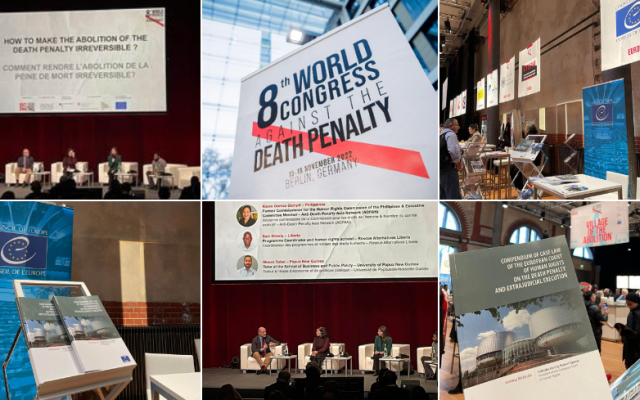
The Ukrainian National Bar Association is one of 53 Bar Associations from around the world which signed a resolution on the need for transparency in the awarding and application of the death penalty. The draft resolution was presented during the 8th World Congress against the Death Penalty, which occurred on November 15-18, 2022, in Berlin. The event brought together more than 1,000 participants from 90 countries - human rights defenders and public figures working to abolish the death penalty. The congress was organized by the partners of the Council of Europe: the Paris-based NGO "Together Against the Death Penalty" and the World Coalition Against the Death Penalty.
During the event, participants will have a unique opportunity to exchange views on furthering the abolition of the death penalty and opposing any attempts to restore the death penalty where it has already been abolished. Considerable attention was also paid to the lawyers' problems in defending persons sentenced to the death penalty.
Among the reasons for the need to adopt such a resolution, in particular, the following:
- despite the growing number of abolitionist states, some countries do not provide official information about their use of the death penalty, considering such information a state secret. Disclosure of a state secret is recognized in such countries as an act of treason;
- in some countries, death sentences are carried out secretly, without prior notification of the parents of the condemned, their lawyers, and sometimes even the condemned themselves;
- showing transparency in the issuing and execution of the death sentence has direct implications for the maintenance of human rights, both for those facing the death penalty and for others;
- without transparency, it is impossible to ensure the humane treatment of persons who are in custody and awaiting the execution of the death sentence and to provide them with proper procedural and legal protection under the applicable international law;
- showing transparency in the imposition and execution of the death sentence limits the ability of lawyers to fully perform their professional duties in the best interests of their clients facing the death penalty.
The signatories of the Resolution are convinced that the bar and professional organizations of lawyers have a key role in defending the idea of the need to abolish the death penalty and introduce a moratorium on this measure of punishment, as well as a role in protecting the rights to a fair trial.
The purpose of this Resolution is to call on bar associations and professional organizations of lawyers of all countries (both abolitionists and supporters of the preservation of the death penalty) to:
- upholding respect for transparency in states that retain the death penalty, data relating to the imposition and application of the death penalty, in particular on persons sentenced to death and executed, the crimes for which they were convicted, the method of execution, and the attack. , when amnesty or pardon was applied to them;
- advocacy for the right to a fair trial and due process of law for all persons facing the death penalty, without discrimination, including a human rights defender's regular access to his client and all evidence against him;
- participation in the international defense of the ideas of transparency in the issuance and execution of death sentences and their abolition throughout the world.
Popular news
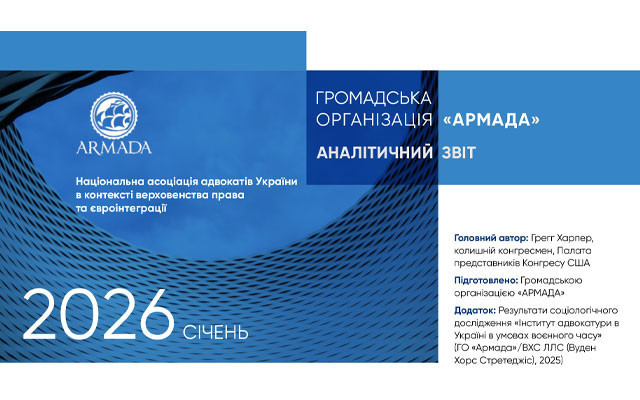
European integration
A translation of the report on advocacy presented to the European Parliament has been published
A translation of a research report on the Ukrainian advocacy profession in wartime, previously presented to the European Parliament in Brussels, has been published. The document is presented as a basis for discussion on the rule of law, Ukraine's European integration aspirations, and countering Russian disinformation in the legal sphere.
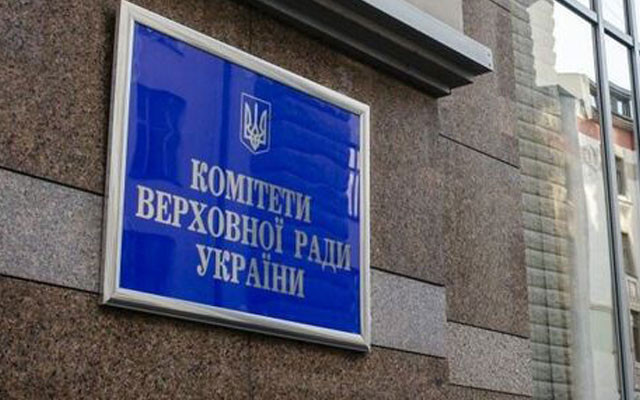
Legislation
The Verkhovna Rada Committee criticized the format of the government working group on advocacy
The implementation of the Roadmap on the rule of law (approved by Cabinet of Ministers Resolution No. 475-r of May 14, 2025) in relation to advocacy raises the practical question of who exactly should prepare legislative changes and how.
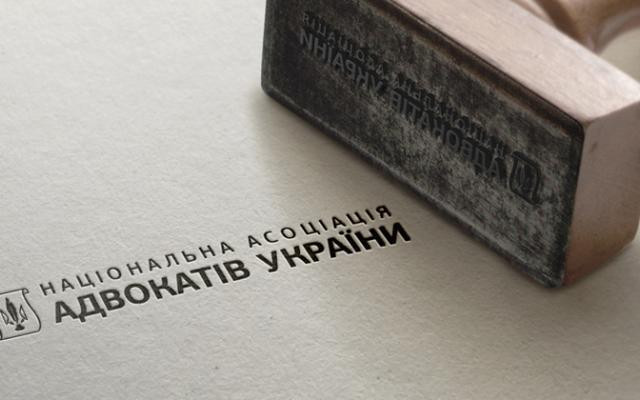
Self-government
The BCU demands a review of the composition of the government working group on reforming the advocacy profession
The President of the UNBA, BCU Lidiya Izovitova, appealed to the Cabinet of Ministers of Ukraine to review the composition of the working group on improving legislation in the field of advocacy and legal practice.
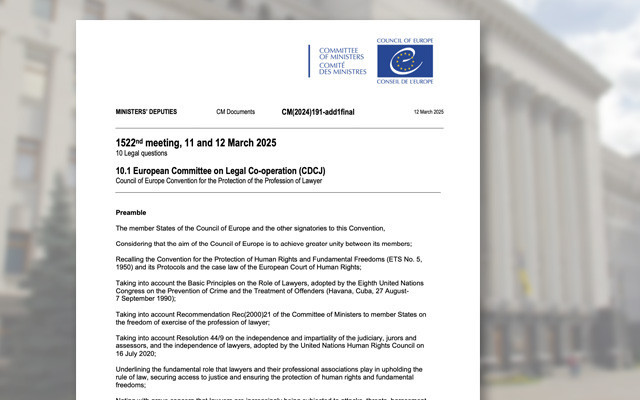
Guarantees of the practice of law
The President has determined, who will sign the Convention for the Protection of the Profession of Lawyer
President of Ukraine Volodymyr Zelenskyy authorized Ukraine's Permanent Representative to the Council of Europe Mykola Tochytskyi to sign the Council of Europe Convention for the Protection of the Profession of Lawyer.

Discussion
Why lowering the age of marriage lacks legal logic
Although until 2012 there was a provision in family law that allowed children to marry from the age of 14 under certain circumstances, its return to Ukrainian law would contradict international obligations and the logic of criminal law.
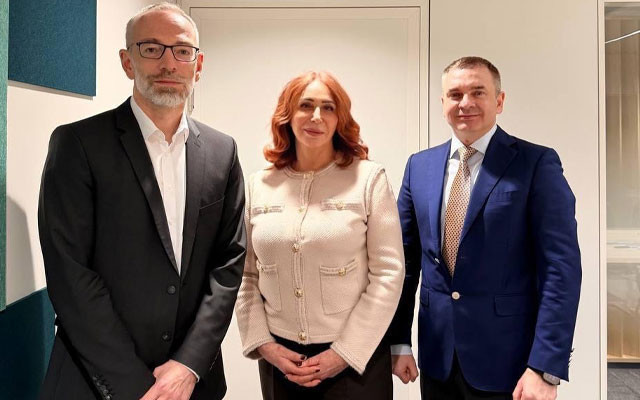
European integration
Open dialogue between the UNBA and the European Commission on the path to EU
The Ukrainian National Bar Association held a working meeting in Brussels with Mr Wolfgang Nozar, Head of Unit for Governance, Rule of Law and Financial Assistance, Directorate-General for Enlargement and Eastern Neighbourhood (DG ENEST), European Commission.

Self-government
A report on Ukrainian advocacy was presented in the European Parliament
Can a shadow report on advocacy replace the political framework of the Roadmap on the rule of law with demands for the restructuring of self-government? Where is the line between accountability and the seizure of institutions? And how can we respond to narratives with data rather than impressions?
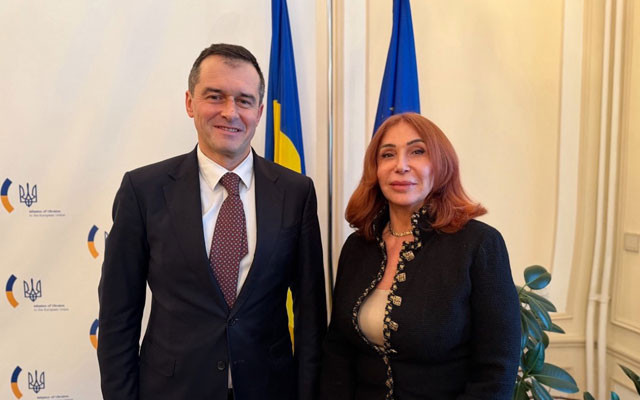
European integration
UNBA and Ukraine's representation to the EU have synchronized their priorities
On February 5, in Brussels, the President of the UNBA, BCU Lidiya Izovitova held a working meeting with the Ambassador Extraordinary and Plenipotentiary of Ukraine, Representative of Ukraine to the European Union Vsevolod Chentsov.
Publications

Volodymyr Matsko Extradition as a systemic form of rights violations

Victoria Yakusha, Law and Business The anti-corruption vertical cannot «take care» of the Bar as an institution, - acting head of the HQDCB

Censor.net Protecting advocates – protecting justice: addressing concerns about the new law

Ihor Kolesnykov A BRIEF SUMMARY REGARDING THE APPLICATION OF THE ORDER ON EXTENDED CONFISCATION IN LATVIA REGARDING FINANCIAL ASSETS OF…

Valentyn Gvozdiy WORKING IN A WAR ZONE

Lydia Izovitova Formula of perfection

Sergiy Vylkov Our judicial system is so built that courts do not trust advocates

Iryna Vasylyk Advocacy in the proclamation of Independence of Ukraine
